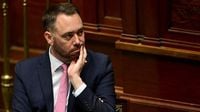WARSAW – Belgium's new Foreign Minister, Maxime Prévot, has expressed his country's readiness to help forge an international coalition aimed at keeping Russian assets frozen, amidst uncertainty about the renewal of EU sanctions this summer. This initiative comes as the Belgium-based clearing house Euroclear holds the majority of sanctioned Russian wealth in Europe, estimated at over €180 billion in public and private assets that were frozen following Russia's full-scale invasion of Ukraine in February 2022.
The current sanctions are set to expire by the end of July 2025, and EU diplomats have indicated that Hungary may attempt to undermine the decision by abstaining from the vote, which is necessary for achieving unanimity among the 27 EU member states. With the clock ticking, Prévot emphasized the urgency of securing these assets and the necessity of exploring alternatives to maintain their frozen status.
In an interview with Euractiv, Prévot stated, "In this case, we absolutely need to have alternatives for keeping the assets frozen. We could have a new international framework initiative, which will force those assets to stay in Euroclear, or another alternative would be a national initiative of the Belgian parliament." He made it clear that Belgium cannot act alone, stressing the importance of a collaborative approach. "We absolutely need to pool the risks," he added, highlighting the legal and financial complexities involved in the situation.
Prévot articulated the need for a "coalition of the willing" to address the challenges posed by the potential lifting of sanctions. He noted, "The time is running, so it is really important to have a clear process identified in the coming weeks, before the moment when we have to decide on the 17th sanction package." Belgian experts are currently working to analyze various possibilities and develop a robust solution to ensure that the assets remain frozen.
Belgium aims to avoid the risks of being pursued by Russia in international courts, which could arise if the country were to act unilaterally. Prévot stated, "Belgium will absolutely avoid being alone and taking all the risk of being pursued by Russia in different courts with only sentimental support from EU member states." He emphasized the need for strong, written commitments from other countries, which may include not just EU members but also support from the UK, Canada, and others.
As pressure mounts for the EU to consider using Russian frozen assets to support Ukraine, Prévot acknowledged the complexity of the situation. He remarked, "We have to be honest, it is clear that the first priority is to keep those assets frozen. The easy way to do that is to validate with unanimity the upcoming 17th sanction package [on Russia]. However, we know that there is a risk that we will lose this unanimity due to the feelings of one or two countries." This statement underscores the delicate balance that EU nations must navigate as they approach the upcoming sanctions discussions.
In a broader context, reports have emerged indicating that Euroclear plans to confiscate and redistribute around €3 billion in frozen Russian assets after Moscow seized funds held by foreign investors in Russia. The EU has been engaged in long-standing debates regarding the confiscation of Russian assets and their potential transfer to Ukraine. However, key countries such as France, Germany, Italy, and Spain have expressed opposition to this move, fearing it could deter international investors and undermine the EU's bargaining power in future peace negotiations.
As Belgium steps forward to lead the charge in forming an international coalition, the stakes remain high. The outcome of the EU's decision on the 17th sanction package could have significant implications not only for the future of the frozen Russian assets but also for the ongoing support of Ukraine in the face of Russian aggression. The coming weeks will be critical as Belgium and its allies work to ensure that the assets remain secure and that a unified front is presented to Russia.
With a complex geopolitical landscape and varying interests among EU member states, the challenge of maintaining a cohesive strategy for Russian assets is daunting. However, Prévot's commitment to collaboration and proactive measures could play a pivotal role in shaping the future of these sanctions and their impact on the ongoing conflict in Ukraine.




